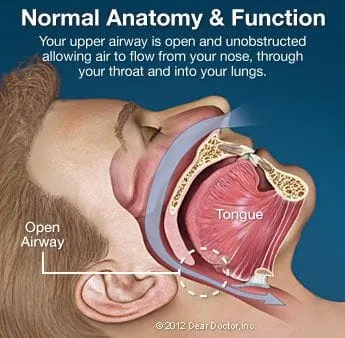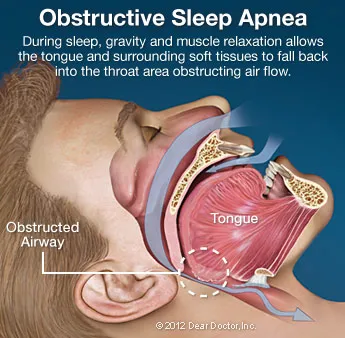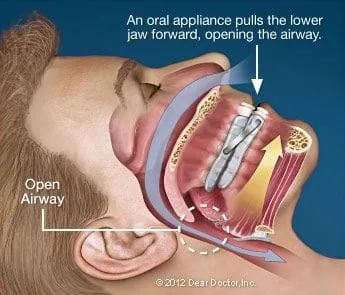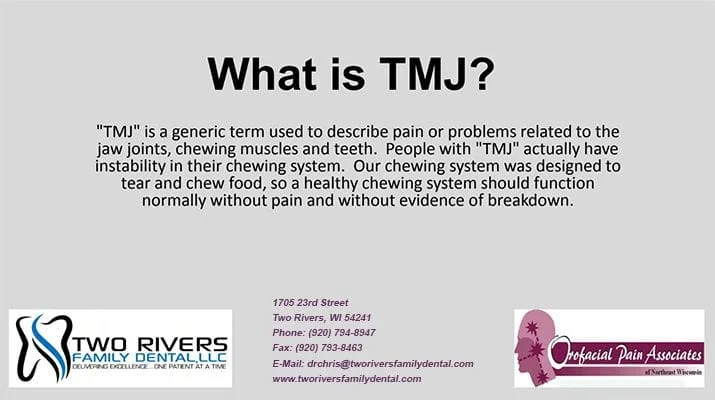Oral Splint Therapy For TMD/TMJ
Oral splint therapy is used to treat jaw pain and headaches. Typically these devices fit over the upper teeth to protect them from wear and breakage. Also the appliance is made to reposition the lower jaw to relax the muscles of the jaw and face to relieve chronic headaches.
Fill out our New Patient TMD Questionnaire Form:
TMD Questionnaire Form
TMD SELF HELP INFORMATION
Note: be sure to go to the last page of the form and Click to Complete.
TMJ Video:
Dental Management of Snoring and Sleep Apnea
We provide dental management of snoring and sleep apnea by fabricating custom fitted devices that are worn during sleep to reposition the jaw and tongue to allow the free flow of air through the airway during sleep. Learn more about snoring and sleep apnea


You know it instinctively: A good night's sleep is essential for good health. It makes you feel rested and ready to take on the world. Yet many people don't get the sleep they need. Sometimes this is related to sleep-related breathing disorders (SRBD) — their own, or those experienced by their sleeping partners.
SRBD is characterized by recurrent episodes of reduced or interrupted respiratory airflow. This is caused by soft tissues near the back of the throat collapsing during sleep so that they partially close off the windpipe. These tissues — the tongue, for example — can vibrate as air passes by, causing snoring. Snoring is often worsened sleeping on one's back because this encourages the lower jaw to slip back, which in turn pushes the tongue in front of the airway.
Loud snoring often disturbs the person in the bed who isn't the one doing it, robbing him or her of vital sleep. The snorer, on the other hand, may seem to be slumbering peacefully, but this might not actually be the case. Chronic loud snoring is a common symptom of Obstructive Sleep Apnea (OSA; “a” – without; “pnea” – breath), which occurs when the upper airway is blocked to the point of causing significant airflow disruption, or even no airflow whatsoever for 10 seconds or more. This can be dangerous. Reduced airflow into the lungs lowers blood-oxygen levels.
A person with sleep apnea may wake 50 or more times per hour — that's almost once a minute! — without having any memory of it. These awakenings, called micro-arousals, last just long enough to restore muscle tone to the airway so the individual can breathe. Unfortunately, all those micro-arousals preclude deep and restful sleep.
Please fill out our New Patient Sleep History Questionnaire:
Sleep History Questionnaire Form
Note: Be sure to go to the last page of the form and Click to Complete.
What to Look Out For
Obstructive Sleep Apnea is a serious matter that can lead to heart problems and other health issues. It's possible you may have OSA if you snore and also suffer from any of the following:
- Excessive daytime sleepiness
- Irritability
- Poor memory/confusion
- Accident proneness
- Night sweats
- Morning headaches
- High blood pressure
- Obesity
How Dentistry Can Help

By now you're probably wondering: What does my dentist have to do with all this? Here's the connection. Snoring or sleep apnea can sometimes be treated with an oral appliance available at the dental office that's designed to hold the lower jaw forward during sleep. This repositioning of the jaw moves the tongue away from the back of the throat, reducing the potential for obstruction. This treatment is backed by a great deal of scientific evidence. It's a good remedy to try before moving on to more complicated breathing devices or surgery to remove excess tissues in the throat.
Only a dentist can fabricate, fit, adjust, monitor, and treat complications associated with Oral Appliance Therapy used in managing SRBD. So if you or a loved one is experiencing any combination of the signs and symptoms mentioned above, a consultation with a dental professional is a good idea.
Do you suffer from Headaches and Facial Pain caused by TMD/TMJ?
Do you suffer from Snoring and Sleep Apnea?
Call Two Rivers Family Dental at (920) 794-7100
for more information about TMD/TMJ problems
and how to dentally manage your Snoring & Sleep Apnea!


